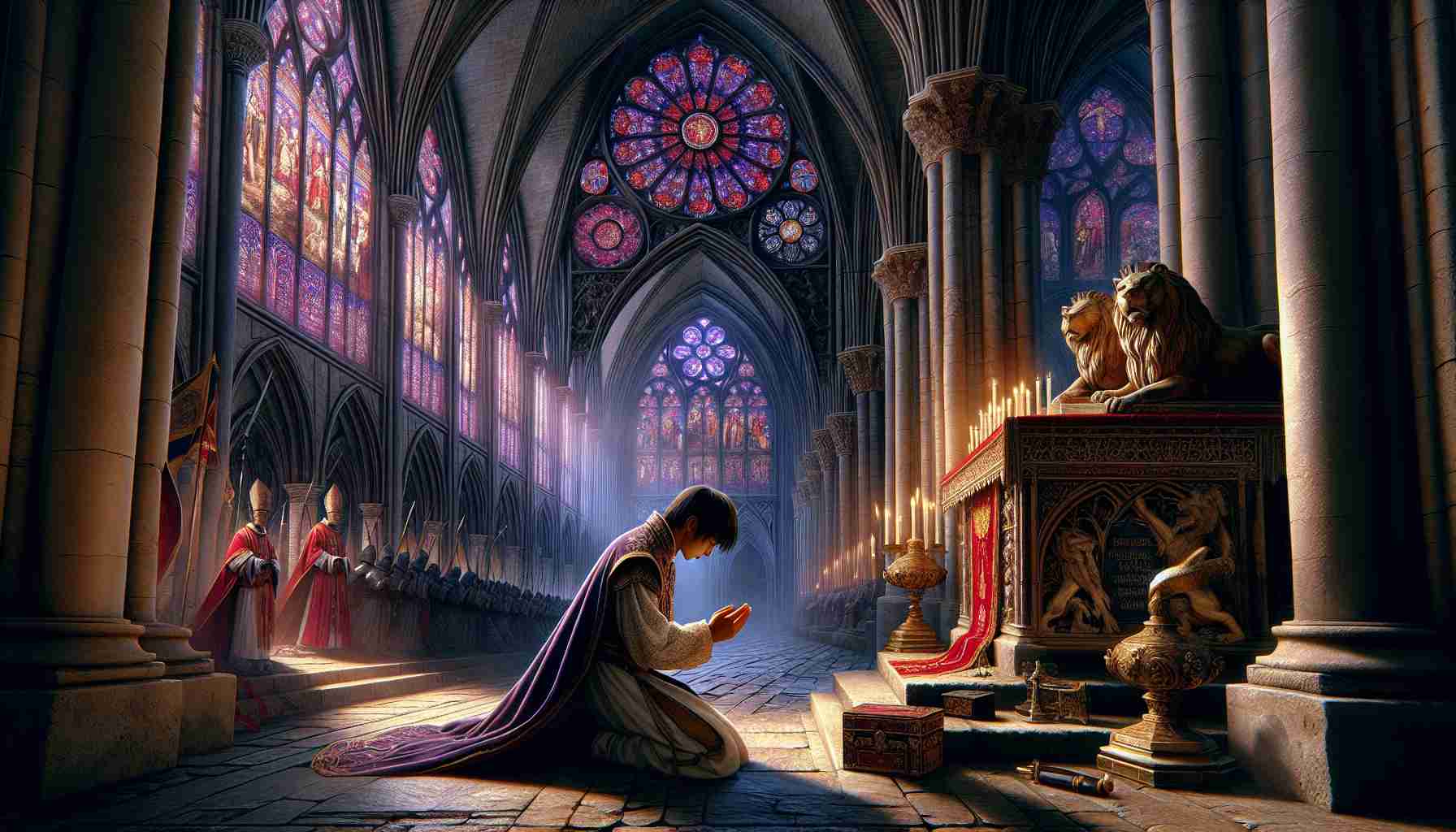

The June skies over Reims broke open with the thunderous toll of cathedral bells as banners snapped in the wind, their gold lilies dancing against the deep blue of Capetian silk. Louis stepped beneath the carved gothic arches of Notre-Dame de Reims, the sacred heart of French kingship, and the murmured prayers of cloistered monks swelled around him like incense. On this fourteenth day of July in the Year of Our Lord 1223, the heir of Philip Augustus entered not just a church, but a covenant inked in the blood of saints and sealed in the oil of anointing.
Stone lions stared out from the high tympanum above the entrance—the throne of Solomon carved in stone, a warning and a promise. Inside, the rose windows flamed with colored fire, casting red and violet halos over the flagstones where kings had walked and fallen. The holy chrism, said to be brought down from heaven by a dove for the baptism of Clovis, still stood sanctified and sealed in the reliquary, guarded by the monks of Saint-Remi.
As the Archbishop approached with the ampulla, Louis bowed his head, his thoughts sharpened by the weight of one verse he had taken to heart since he was a boy: “I will speak of Your statutes before kings and will not be ashamed” (Psalm 119:46). His lips moved without sound, an echo of David's resolve. He would wear the crown not as conqueror but confessor.
Outside, the crowds roared their approval, unaware of the burden their new king would soon shoulder. The scars left by the Cathars ran deep across Languedoc, where faith had fractured and fire had followed. These weren’t distant lands but disputed souls, and Louis—armed more with absolution than ambition—had once joined his father and Pope Innocent III in the war to reclaim them.
Those who followed the Cathar heresy whispered that the visible church was corrupt, that matter itself was evil. They denied the sacraments, cast out the Eucharist, and mocked Christ’s incarnation. They called themselves the "pure," yet they turned from the blood He shed in Gethsemane, from the agony on Golgotha. Louis had seen their strongholds—Montségur, Lavaur—withered under siege. He had heard the last cries of believers buried in burning cellars, both cathar and catholic, butchered alike when the zeal of righteousness slipped its reins.
He had watched a woman bow to kiss a cross etched onto a knight’s shield, her faith mingled with fear and hope. He had wondered often: could truth be wielded like a sword without drawing blood unjustly?
Now, lifted high above the nave in Reims, the Byzantine crown touched his brow. The choir broke into a heavenly Gloria, and the scent of frankincense carried toward the vaults. Mercy is not weakness, Louis whispered to himself. Truth must be guarded. Yet, was every blade drawn and castle burned in God's will—or man’s judgment?
In his court, Louis would summon bishops, scholars, and scribes. He enforced the Latin rite steadily, extending Paris’s justice across provinces long ruled by lords friendlier to heretics than to Rome. He reformed tax abuses, protected cloisters, and began to build bastions where monks could pray in peace. But he also pressed the crusade forward, calling banners and mustering armies, even if the war now taxed the spirit more than the sword.
It was said he wept quietly when reading letters from priests who had baptized former Cathars, only to see them imprisoned by overzealous inquisitors. One abbot recalled how Louis had spoken late into the night near a chapel fire, his hands outstretched to the blaze, saying, “If the Word is to win hearts, it must be sung more than shouted—why else did David compose with harp?”
He ruled only three years and died on the road back from another campaign—a final attempt to secure Provence and bury heresy deeper into the land. His death was swift, some said from dysentery, others whispered of poison. His body was laid to rest beside his father at Saint-Denis, the place of martyrs. But his will outlived him.
In time, the Cathar faith dwindled under the relentless hand of Rome. Languedoc became France. The heresies waned, though not without grief, and a fragile peace rose, built not on ashes, but on memory.
Notre-Dame de Reims would outlast centuries, hosting kings beyond Louis’s memory, surviving wars and revolutions. But deep in its crypt, monks still whispered of the crusader king with the resolute eyes who had come not only to reign, but to speak of God's statutes before kings and lords, unashamed.
And in its stained glass, tucked in the corner amid prophets and thrones, David still plays his harp, reminding all who pass beneath that stone and sword may pass away, but truth—even challenged—must be spoken.